Begonias aren’t just pretty faces—they’re loaded with meaning that stretches across cultures and spiritual paths. They stand for caution, change, protection, and personal growth, making them one of those flowers that seem to pop up whenever life’s in flux or you’re deep in inner reflection. Their quirky shapes and punchy colors have always reminded people of individuality, balance, and the guts it takes to start over.
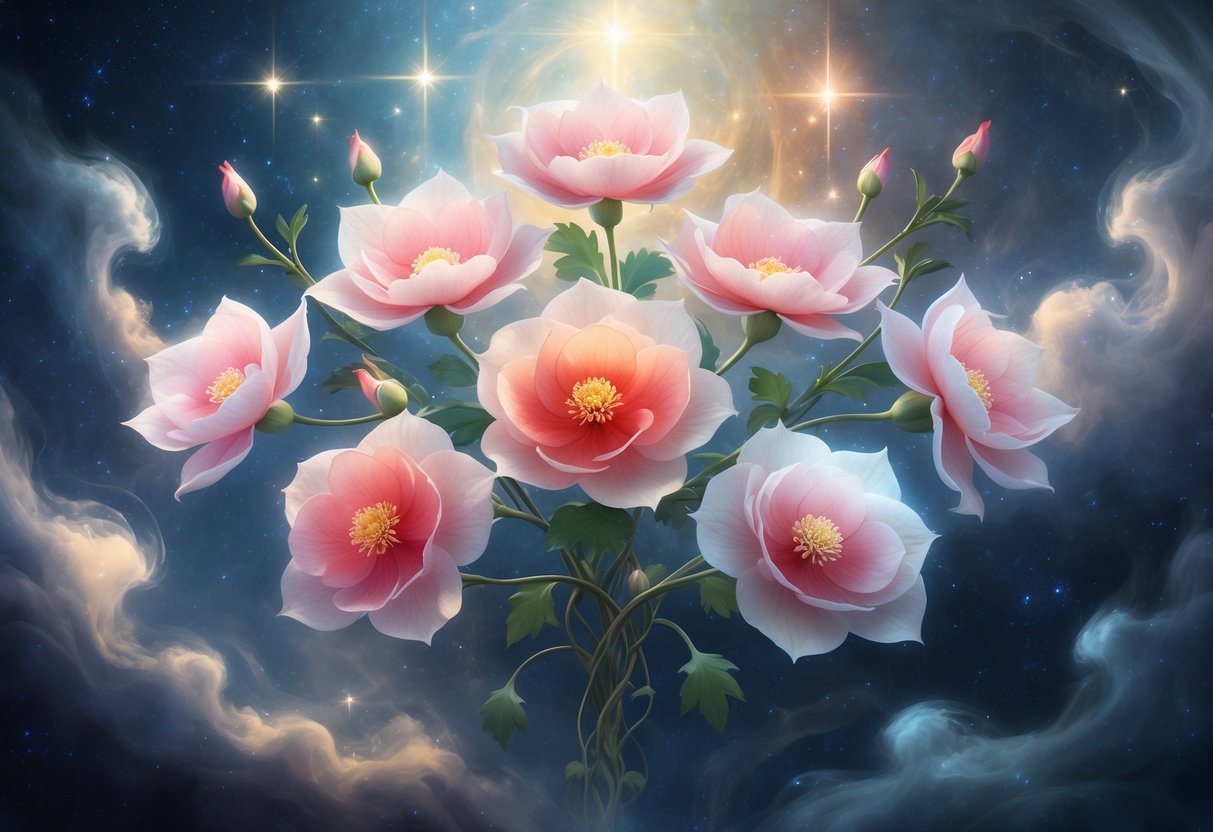
Digging into their symbolism, you’ll find begonias tied to healing, creativity, and a sort of harmony with the natural world. They don’t just brighten up a room—they nudge you to remember resilience, adaptability, and the value of making thoughtful choices.
For lots of folks, begonias quietly guide them through tough times, offering protection from bad vibes and a gentle push toward renewal.
People have used begonias to express love or as symbols of prosperity. Their spiritual value pops up in daily routines and rituals.
These meanings can shift your perspective, spark growth, and help you feel more connected to yourself and the world. Sometimes it’s the little things in nature that do the heavy lifting for our spirits.
Key Takeaways
- Begonias pack a punch with spiritual meanings around growth and protection
- Color and symbolism shape how people use them in rituals and daily life
- Cultures lean on begonias for spiritual and personal balance
Overview of Begonia Flower Spiritual Meanings
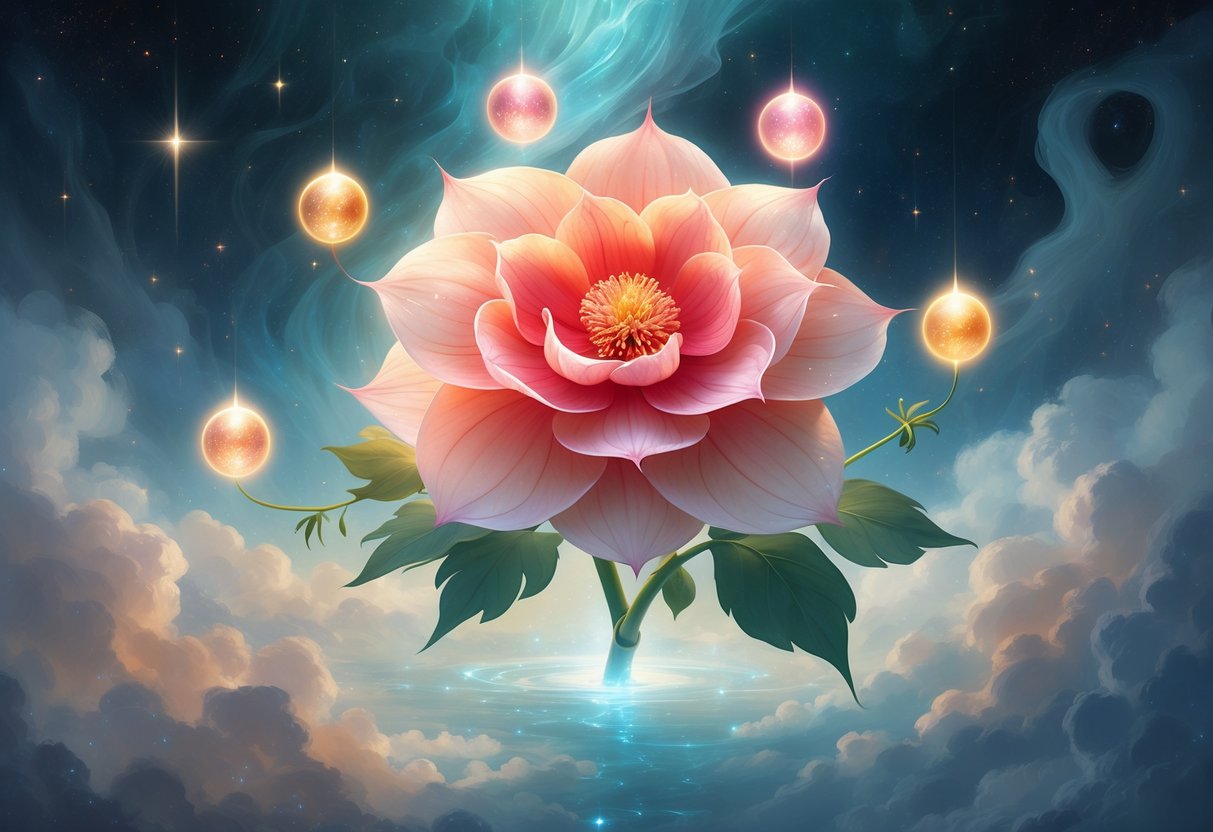
Begonias come with layers of meaning rooted in culture and spirituality. People link them to caution, renewal, and protection.
They also stand for gratitude, prosperity, and personal growth. Their influence goes way beyond just looking nice; they play a role in spiritual practices and interpretations all over the place.
Historical Symbolism and Origins
Back in the Victorian era, people gave begonias to signal caution or wariness. They noticed the flowers folding up at night and saw that as a sign of retreat and self-protection.
Older traditions picked up on their individuality too. Those offbeat leaves and varied blooms made begonias a natural symbol for standing out and being yourself.
Some cultures saw begonias as reminders to celebrate what makes you different instead of blending in.
Stories and folklore gave begonias a protective vibe. Folks believed begonias could ward off bad luck or negative energy, so you’d often find them near doorways or tucked into gardens.
As years passed, people blended this protective symbolism with ideas of resilience and adaptability, since begonias seem to thrive just about anywhere.
Begonia Flower Meaning in Spiritual Practices
People often use begonias in spiritual settings for their symbolic wisdom. They’re tied to caution in decision-making, nudging you to pause and think before leaping into something new.
You’ll spot begonias on altars, tucked into offerings, or simply nearby during meditation to bring a little balance and clarity.
Begonias also connect to healing and renewal. Their presence can help with emotional recovery after a rough patch and spark creativity or inspiration.
Some traditions believe begonias attract prosperity, especially if you keep them in your workspace or use them in abundance rituals.
In these ways, begonias aren’t just symbolic—they become practical tools for reflection, protection, and personal growth.
The 8 Spiritual Meanings of Begonia Flowers
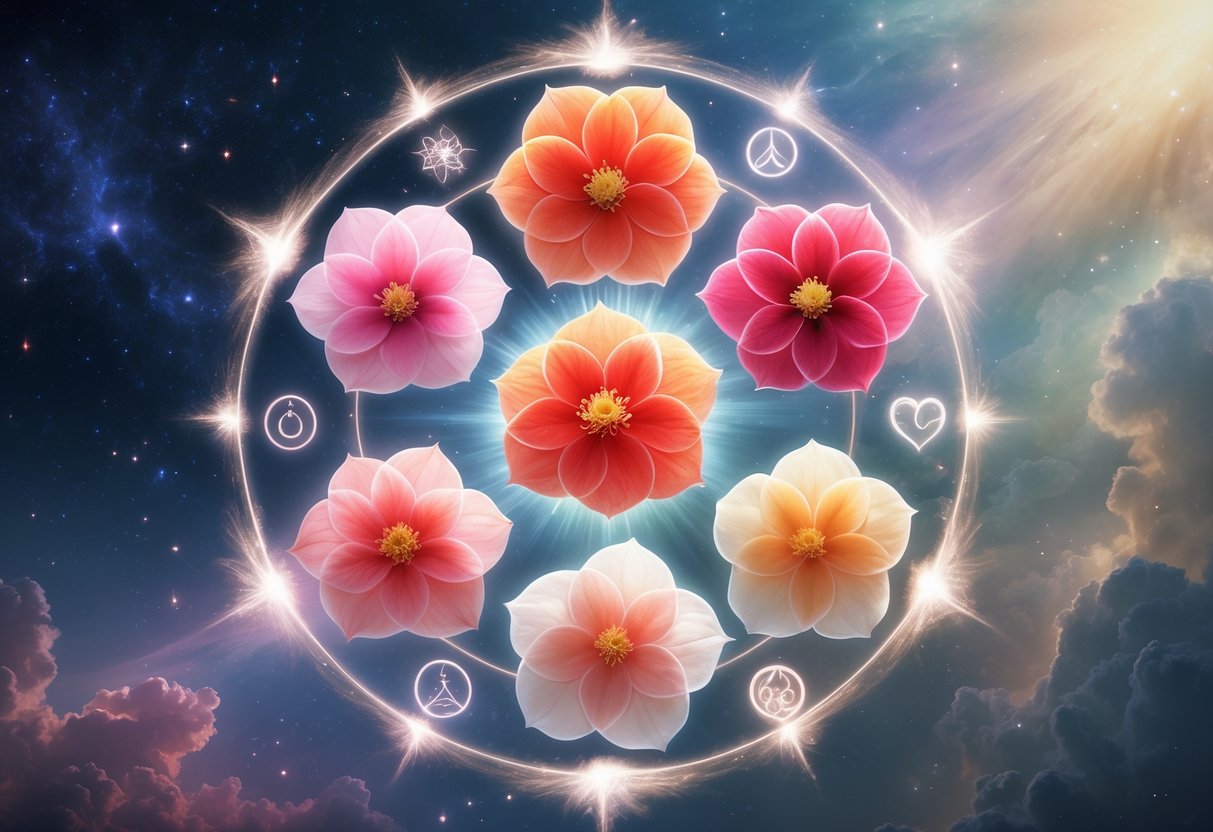
Begonias come loaded with symbolism—think caution, transformation, reflection, spiritual connection, harmony, gratitude, prosperity, and individuality.
These meanings aren’t random; they’re shaped by both cultural traditions and the plant’s quirks, giving begonias a real depth that goes beyond the surface.
Caution and Protection
People have seen begonias as a symbol of caution for ages. In Victorian times, giving someone a begonia was a subtle way to say, “Hey, be careful with this new thing.”
Their habit of closing up at night just added to this watchful reputation.
On the spiritual side, folks view begonias as protective plants. They believe begonias help block out negative energy and make spaces feel safer and more peaceful.
Some people put begonias near doors or in living rooms to act as a barrier, filtering out bad vibes. It’s more than just a pretty flower—it’s like a gentle reminder to protect your energy and move carefully.
Embracing Change and New Beginnings
Begonias don’t mind a challenge—they’ll thrive in all sorts of conditions, which is why they symbolize adaptability.
You’ll see them flourishing indoors or outside, quietly showing off their resilience.
Spiritually, begonias represent fresh starts. People often link them to the courage it takes to jump into new chapters, whether that’s moving, starting a job, or opening up to a relationship.
Their growth cycle—shedding leaves, blooming again—mirrors personal transformation. Just like begonias, we sometimes need to let go of what’s holding us back and welcome something new.
Inner Reflection and Self-Awareness
Begonia flowers, with their wild patterns and colors, naturally draw your eyes—and your mind—inward. Their unusual shapes make you stop and think, which is why they’re seen as a symbol of self-awareness.
Spiritual traditions use begonias to encourage inner reflection. Watching them can remind you to honestly check in with your choices, strengths, and flaws.
People often keep begonias in meditation or journaling spaces. Their vibe helps create a calm spot where you can dig a little deeper and make sure your actions match your values.
Connection to the Divine
Some folks bring begonias into spiritual rituals to help connect with higher guidance. Their bright presence can make a space feel a bit more sacred.
You’ll find begonias on altars or used during meditation to sharpen focus. In a few traditions, people offer begonia petals in prayer, signaling openness to divine messages.
This isn’t just about looks. Here, begonias become a bridge between the physical and spiritual world, nudging people to seek clarity and wisdom that’s bigger than themselves.
Harmony and Balance
Begonia leaves have this natural symmetry, and their growth patterns just seem balanced. Gardeners love how they bring a sense of order and calm to a space—visually and spiritually.
Spiritually, begonias remind us to keep life balanced. They encourage you to find a steady rhythm between work and rest, giving and receiving, or thinking and doing.
Caring for begonias can even be a mindfulness practice. Tending to them might remind you to nurture balance in your own life, helping you stay grounded and healthy.
Gratitude and Appreciation
People often give begonias as a way to say thanks. Their bright blooms last a while, making them perfect for showing appreciation for friendship or support.
Spiritually, begonias stand for recognizing your blessings. Keeping or gifting one can help you remember to notice the good stuff and the people who bring it into your life.
Giving begonias can strengthen relationships. Sometimes, a flower says what words can’t—offering a begonia can deepen respect and connection.
Wealth and Prosperity
In plenty of traditions, begonias are linked to abundance. Their thick leaves and steady blooms make people think of growth and prosperity.
Some folks keep begonias at work or home, hoping to draw in financial luck and stability. They even pop up in prosperity rituals, with petals used in offerings or symbolic acts.
Here, begonias don’t just stand for money—they’re about having an abundant mindset. Their energy encourages productivity, resourcefulness, and spotting opportunities when they come knocking.
Uniqueness and Individuality
Begonias have these funky, uneven leaves that set them apart from other plants. That asymmetry makes them a symbol of individuality and embracing what makes you different.
Spiritually, begonias remind us to be authentic. They encourage people to own their quirks instead of trying to fit in.
This message can hit home for anyone struggling with self-confidence. Begonias show that being unique isn’t a flaw—it’s a strength that makes you, well, you.
Begonia Flower Color Meanings and Their Spiritual Significance
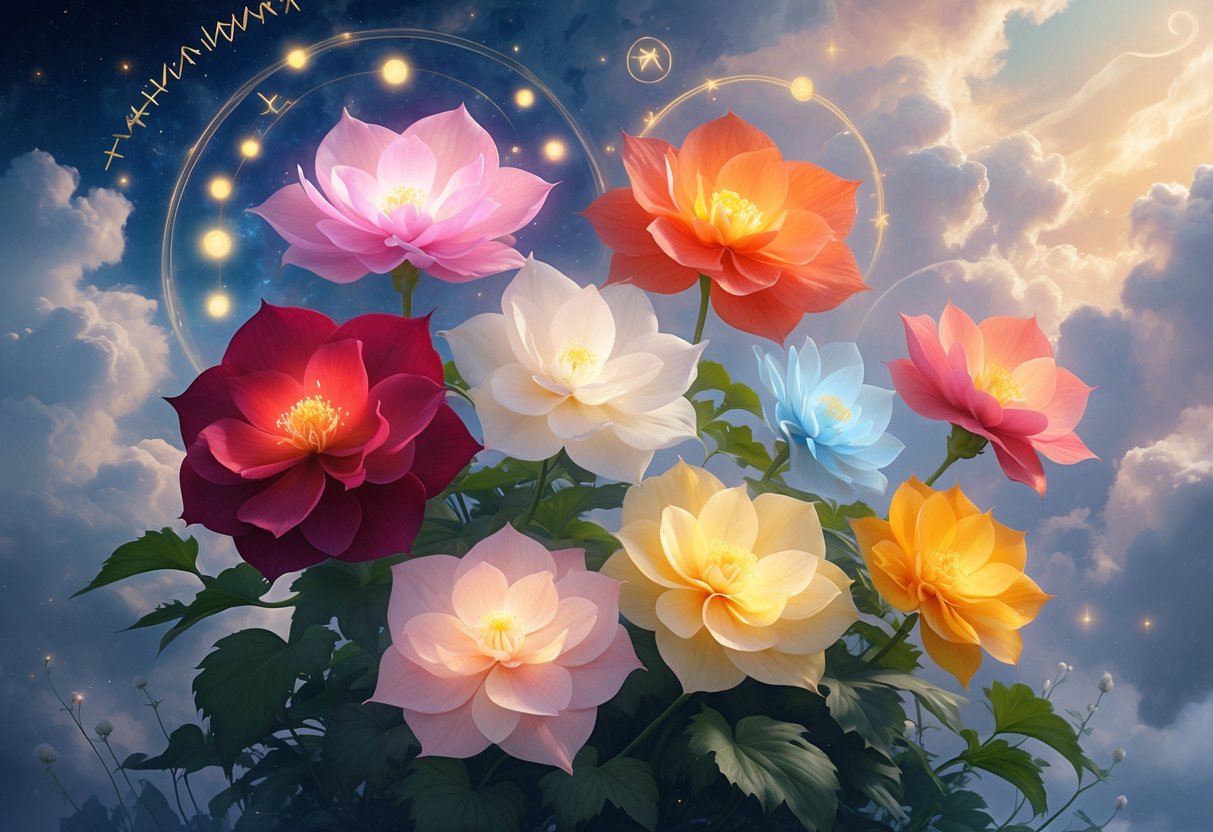
Begonia flowers don’t just have one meaning—their color changes everything. Each shade brings its own spiritual message, from courage to optimism, sincerity to creative spark.
Red Begonia: Passion and Courage
Red begonias are all about big feelings—love, desire, vitality. That bold color screams passion, so people often use red begonias to show deep affection or commitment.
Spiritually, red begonias stand for courage. They nudge you to face challenges head-on and push through with determination.
In lots of traditions, red flowers mean life force and resilience, and red begonias fit right in.
Keeping a red begonia around can be a confidence boost. People see them as a symbol of support when starting something new because they radiate emotional warmth and strength.
Pink Begonia: Affection and Kindness
Pink begonias give off a softer, nurturing vibe. That gentle color stands for affection, kindness, and compassion—perfect for saying thanks or showing appreciation.
Spiritually, pink begonias are thought to help with emotional healing. They can bring harmony to relationships by encouraging empathy and understanding.
People see them as flowers that build trust and strengthen bonds. If someone’s going through a tough emotional stretch, a pink begonia is like a gentle hug, symbolizing care and reassurance.
Here, love comes through as kindness, not just intensity.
Yellow Begonia: Joy and Optimism
Yellow begonias just radiate happiness and good energy. That bright color stands for joy, cheerfulness, and the knack for spotting opportunities even when things get rough.
Spiritually, yellow begonias connect to optimism and renewal. They’re a nudge to stay open to growth and embrace life’s twists and turns.
Some traditions tie yellow flowers to clarity and wisdom, which matches the uplifting vibe of yellow begonias.
Giving someone a yellow begonia is like sending a bit of encouragement. It’s a wish for success, new beginnings, or just brighter days ahead. Having one around can make a space feel sunnier and more positive.
White Begonia: Purity and Sincerity
White begonias carry a message of purity, sincerity, and honesty. Their simple look reflects spiritual clarity and truth, making them meaningful in moments when integrity matters.
Spiritually, white begonias are tied to peace and calm. People use them in meditation spaces or ceremonies where pure intentions are the focus.
They also stand for renewal—a fresh start, free from old baggage.
Giving a white begonia can be a sign of respect and genuine intentions. Some choose them for moments of reflection or remembrance, since they symbolize honesty and quiet strength.
Orange Begonia: Creativity and Energy
The orange begonia radiates enthusiasm, creativity, and vitality. Its bold color really sparks new ideas and fuels motivation to make them real.
Spiritually, people see the orange begonia as a flower that stirs action. It nudges you to chase your passions with energy and a bit of confidence, even if you’re feeling stuck.
If you’re dealing with creative blocks, this flower hints at a fresh wave of imagination and resourcefulness.
It also stands for a balance between joy and determination. While it’s uplifting, there’s a grounding vibe that helps you stay focused and keep going.
An orange begonia can remind you to channel energy in a way that’s productive, but also to keep your enthusiasm alive.
Begonias in Spiritual Practices and Rituals
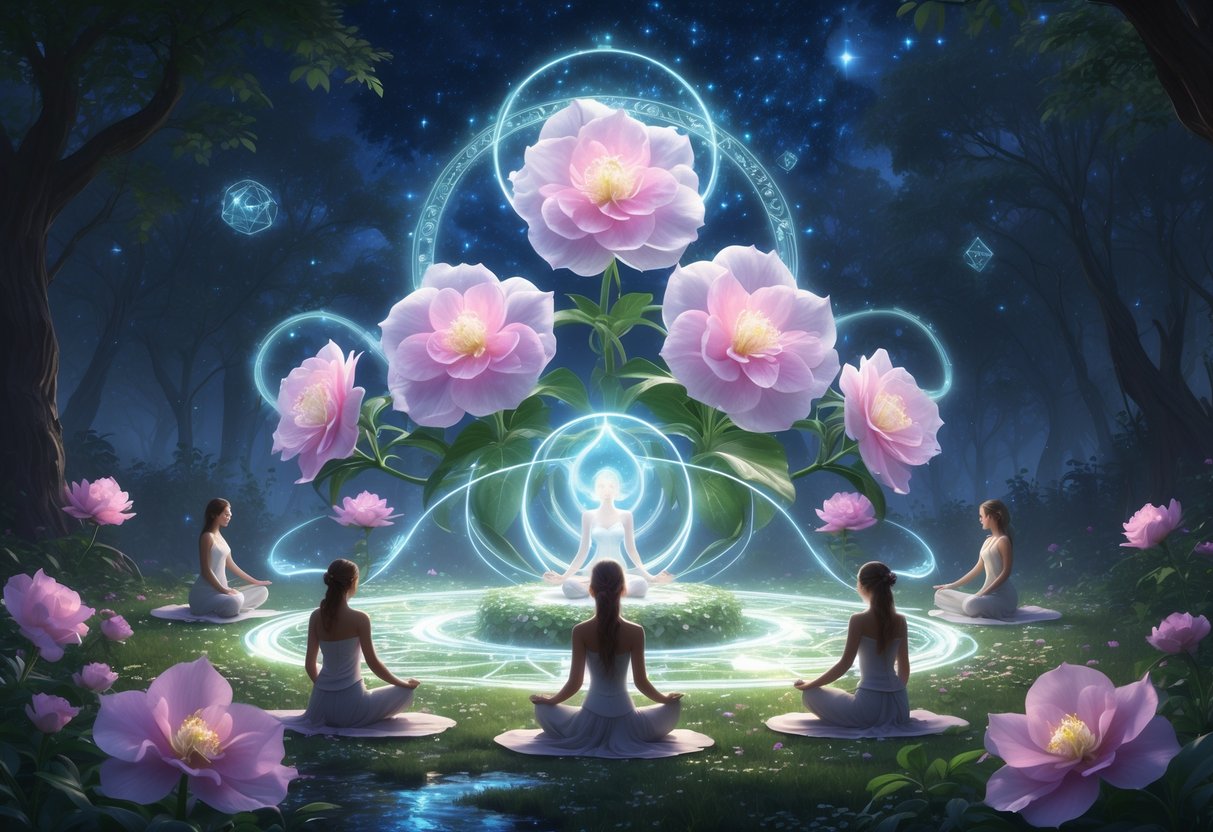
People have long included begonias in spiritual practices because they connect to protection, renewal, and emotional balance. Folks often place them in reflective spaces or use them for intentional acts that deepen connections with themselves, others, or something greater.
Begonias in Meditation and Altar Use
A lot of people put begonias near their meditation spots to create a calming vibe. Their presence tends to encourage focus and invites a bit of inner reflection, which is handy when you’re after clarity.
On altars, whether personal or shared, begonias act as symbols of harmony and protection. People often pick their colors on purpose—white for peace, red for love, yellow for optimism—based on the ritual’s intent.
Some folks use begonias as living offerings. Since potted begonias keep growing, they stand for renewal and the ongoing nature of spiritual growth. That makes them especially meaningful in long-term practices that value consistency and growth.
Symbolic Gifting and Offerings
People often give begonias as gifts to show gratitude, affection, or support. In spiritual circles, gifting a begonia can mean protection from negativity or encouragement during big changes.
Begonias also show up in offerings, whether at shrines or in ceremonies. Sometimes petals get scattered for prosperity rituals, or whole plants might be given for fresh starts like weddings or new businesses.
Offering begonias is all about intention. Whether you’re honoring a deity, blessing a home, or strengthening bonds, the act reflects care and mindfulness. In this way, begonias become a real bridge between what we hope for and what feels spiritual.
Cultural Perspectives and Folklore of Begonia Flowers
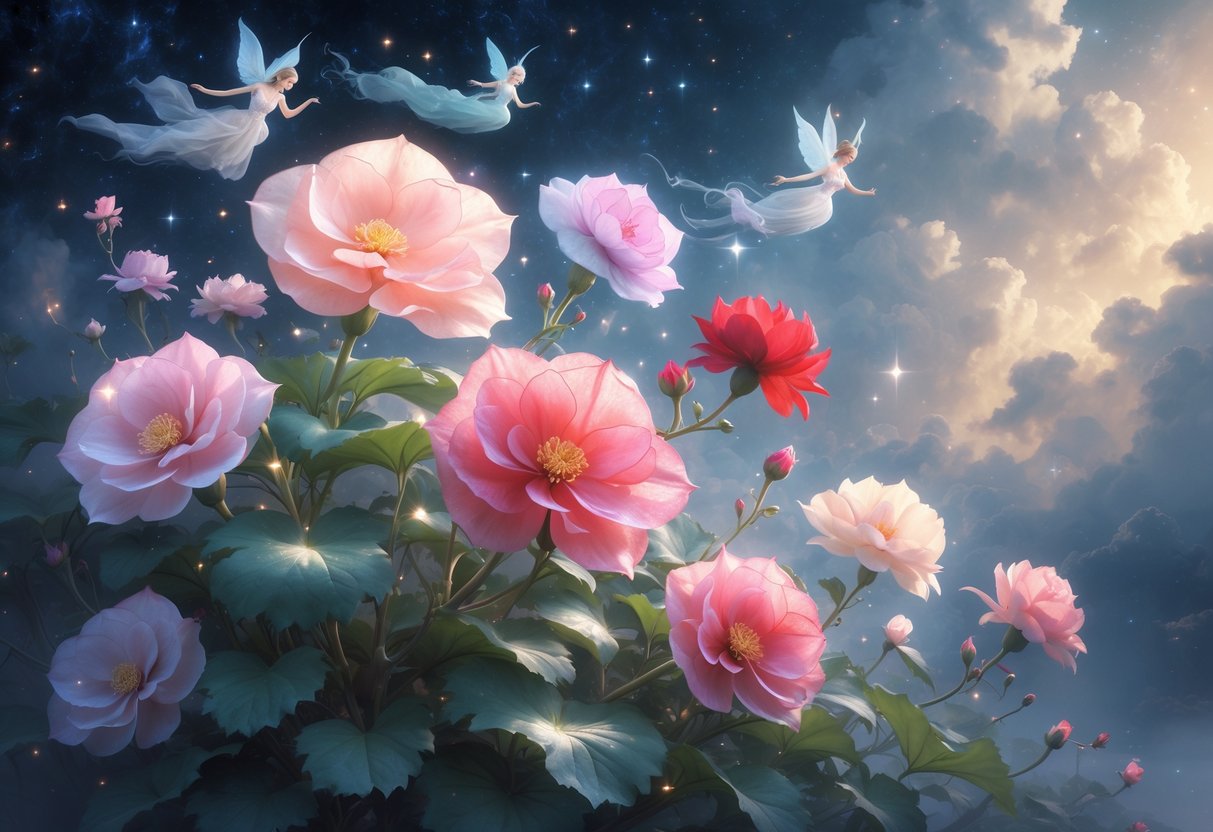
Begonias carry all sorts of meanings that really depend on cultural context. People have linked them to caution, gratitude, good fortune, and protection, and plenty of folklore highlights their role in guiding behavior or keeping negativity at bay.
Begonia Symbolism Across Cultures
In Victorian England, begonias played a part in floriography, the “language of flowers.” They stood for caution and were given as a subtle nudge to be careful in new situations. At the same time, they also meant gratitude, making them a curious mix of warning and thanks.
Some modern Western traditions see begonias as symbols of individuality and emotional depth. Their quirky leaves and bright blooms speak to uniqueness and resilience, so they’re a favorite for expressing personal character.
In Asian cultures, people associate begonias with good luck and prosperity. They’re sometimes placed in homes or businesses to attract financial growth and harmony. Their lush look and ability to thrive in so many conditions really drive home the idea of abundance and adaptability.
These associations show that begonias aren’t just decorative—they carry meaning that shapes how people use them in all sorts of spaces.
Begonias in Folklore and Tradition
You won’t find one single begonia folklore, but they show up in different traditions with real symbolic punch. Some stories say begonias protect against negative energy or ill intentions. Folks believed that having them in the garden made things safer and more balanced.
Folklore also links begonias to transitions and renewal. Since they can regrow leaves and bloom in all sorts of climates, people saw them as symbols of resilience and change. This led to their use in rituals focused on fresh starts or personal transformation.
Certain folk practices included begonias in ritual offerings or placed them on altars. They made good companions for meditation and prayer, helping people strengthen spiritual focus. Traditions like these highlight begonias as more than just pretty plants—they’re tools for spiritual and emotional well-being.
Incorporating Begonias Into Daily Life for Spiritual Growth
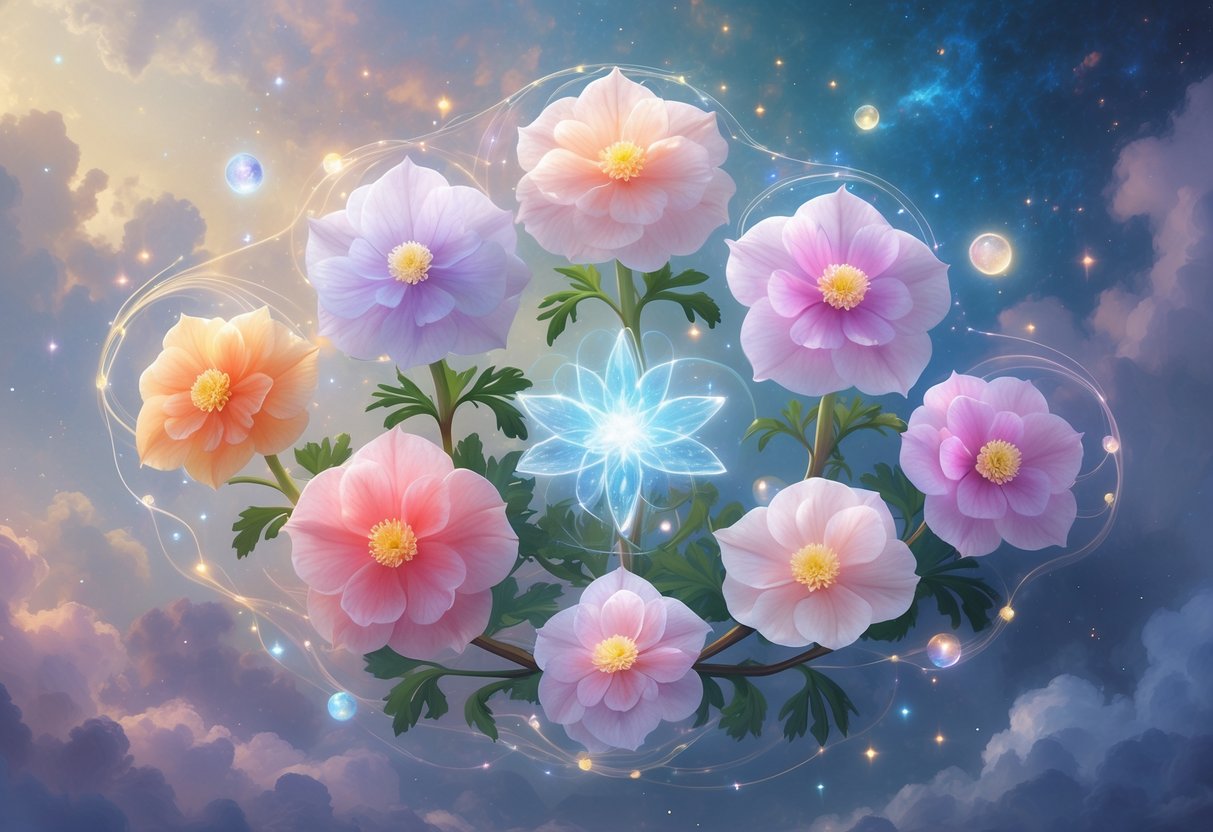
You can work begonias into your daily routines in ways that bring balance, mindfulness, and intention. With a bit of care and purpose, their presence supports both emotional well-being and spiritual practice.
Growing Begonias for Spiritual Harmony
Caring for begonias is a steady reminder to stay patient and attentive. Simple acts like watering, pruning, and just noticing their growth create moments of mindfulness that help ease stress and bring a little inner calm.
Tending to these plants turns gardening into something more grounding than just chores.
Placing begonias in your living space can change the atmosphere. Setting them near a meditation nook or your desk encourages focus and clarity.
Their lively colors and neat leaves add visual balance, which can help create a sense of harmony at home.
Begonias do best in bright, indirect light and like moderate watering. Creating the right conditions keeps them healthy, and honestly, it mirrors how important balance is in our own routines.
Nurturing these plants reinforces habits of consistency and care—habits that support spiritual growth.
Choosing the Right Begonia for Your Intentions
Different types and colors of begonias have distinct symbolic associations. Red begonias often stand for love, vitality, and courage, making them a good pick if you’re focusing on relationships or building confidence.
Pink ones might symbolize compassion and emotional healing, while white begonias are all about purity and renewal.
Choosing a begonia that matches your personal goals gives it extra meaning in your spiritual practice. Someone wanting protection from negativity might pick darker-leaved varieties, while a person chasing creativity could go for the brightest blooms.
Here’s a quick reference:
| Begonia Type/Color | Common Association |
|---|---|
| Red | Love, passion, vitality |
| Pink | Compassion, emotional healing |
| White | Purity, fresh starts |
| Dark-leaved | Protection, resilience |
When you choose with intention, the begonia becomes more than just décor—it turns into a living symbol that supports your own kind of growth.
Frequently Asked Questions
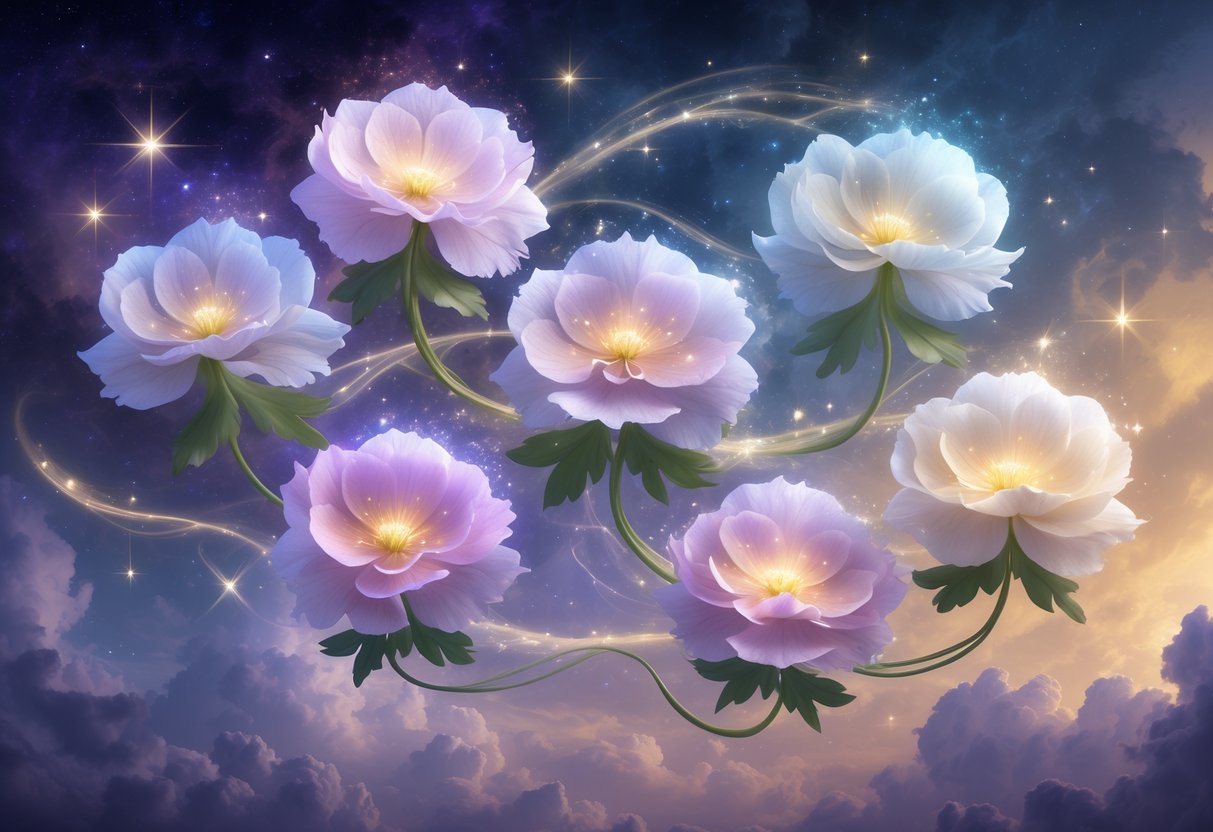
Begonia flowers have layered meanings that connect to individuality, mindfulness, and spiritual practice. Their symbolism covers color, ritual use, and ideas about balance, making them pretty significant in both personal and cultural settings.
What are the spiritual significances associated with begonia flowers?
Begonias often stand for uniqueness, caution, gratitude, and protection. They’re also tied to individuality and standing apart, thanks to their distinct leaf and flower shapes. In spiritual circles, they can point to being aware of your own path and the importance of personal growth.
How do begonia flowers symbolize communication with the spiritual realm?
Some traditions see begonias as a sign of heightened awareness, and a symbol of receptivity to spiritual messages. Their presence might be a nudge to listen more closely to your intuition and those subtle hints life sends.
In what ways do begonias represent inner reflection and meditation?
Begonias are linked to self-awareness and inner balance. Their symmetrical yet varied patterns can make you think about life’s complexities, so they’re a nice fit for meditation and quiet introspection.
Can begonia flowers be used in spiritual or religious rituals, and if so, how?
Definitely. Begonias fit right into rituals as offerings, altar decorations, or meditation aids. People use them with intentions like protection, gratitude, or seeking clarity, depending on what the ceremony is about.
What do different colors of begonia flowers signify in a spiritual context?
Color really matters here. Red begonias might mean passion and vitality, while pink ones suggest affection and kindness. White is usually about purity and peace, and yellow connects to joy and positive energy.
How are begonias linked to concepts of balance and harmony in spirituality?
Begonias show off natural contrasts. Their asymmetrical leaves grow in a way that still feels balanced.
People see this as a symbol of harmony within diversity. Spiritually, begonias remind us there’s a kind of balance hiding in life’s opposites.
Follow us on Social Media!
I’m Nina, and I’m very passionate about spirituality. Exploring the depths of the soul and connecting with the divine has always been my source of inspiration. Join me on a journey of self-discovery and inner peace through my writing.
